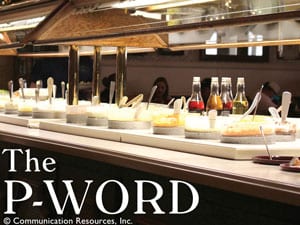THE P-WORD

I was recently cruising the buffet at a neighborhood gathering with a lot of “unchurched” (or de-churched, or non-churched, or whatever we’re calling “them” these days) and got into one of those typical conversations that we clergy types tend to stumble into. After some winsome discussion of our golf games and how the baseball season is shaping up, one of my new acquaintances asked the question, “So, what do you DO?”
Now, let me say upfront that I’m glad to be a pastor, love my work, believe it’s important. But I have noticed that, despite my inherent charm and thinning hair, people who are not church-connected usually associate the “p-word” with some slickly coiffed TV preacher spouting platitudes or denouncing someone or something. It’s no secret to any of us that our profession has gotten a bad rap in recent years due to the scandals, silliness and downright stupidity of some of our colleagues. Telling someone you are a pastor is, at least in some settings, the social equivalent of passing gas — people are still polite to you but they tend to keep their distance.
Add to this the fact that when I tell people my vocational title, they usually respond in a couple of ways: One, they want to tell me all the reasons why they haven’t been in church lately (even though I’m not their pastor). I’ve taken several confessions next to the bean dip at parties. Or, two, they want to tell me all the things that are wrong with “organized religion.” When this happens I find myself nodding my head a lot and making some joke like “Well, if you came to my church you wouldn’t find it too organized.” All in all, it makes for a party experience that is significantly less fun than beer commercials make them out to be.
So, there by the fried chicken, having used the “p-word” for the umpteenth time in answer to the question and receiving the standard socially awkward stare, I decided that I have to come up with a different description for our profession. When you get right down to it, fellow pastors, what do we do?
There are a lot of different ways you could answer that but, after several days of deliberation, I’ve determined my new answer: I’m a storyteller.
After all, that’s most of what we clergy actually do when you get right down to it. Preaching, of course, is storytelling; so is counseling, so is the meeting with the church board, so is just about anything else we do. We’re one of the very few professions that gets to listen to and tell stories every day.
People love stories — love to listen to them, read them, watch them, love to tell their own. Movies, books, TV, newspapers — it’s all about the stories.
Consider this: Jesus was the life of every party he went to and, I believe, that was because everyone there knew he could tell a good story. I imagine him surrounded by people, listening to their stories, telling a few of his own, laughing, crying, making connections. That’s why people followed him. They wanted to know more of the story.
Next time someone asks you what you do, try this experiment — tell them, “I’m a storyteller” and see what happens. I’m guessing that you’ll get to hear their stories while you tell a few of your own. Maybe you’ll even get an opportunity to tell the story in a new way. At the very least, it’ll make for more interesting party conversation.
Save the “p-word” for the business card.
Share this Post:
Looking for More?
Imagine having fresh help in preparing your sermons right at your fingertips, especially during those weeks when your words and ideas are not flowing easily. Homiletics Online won’t write the sermon for you but once you’ve used this treasury of solid content, you’ll wonder how you ever got along without it.
Would you like to see your post on this blog?
We are always looking for talented and passionate writers who want to share their ideas on preaching the Gospel. If that sounds like you, then please use the button to submit a guest post.

